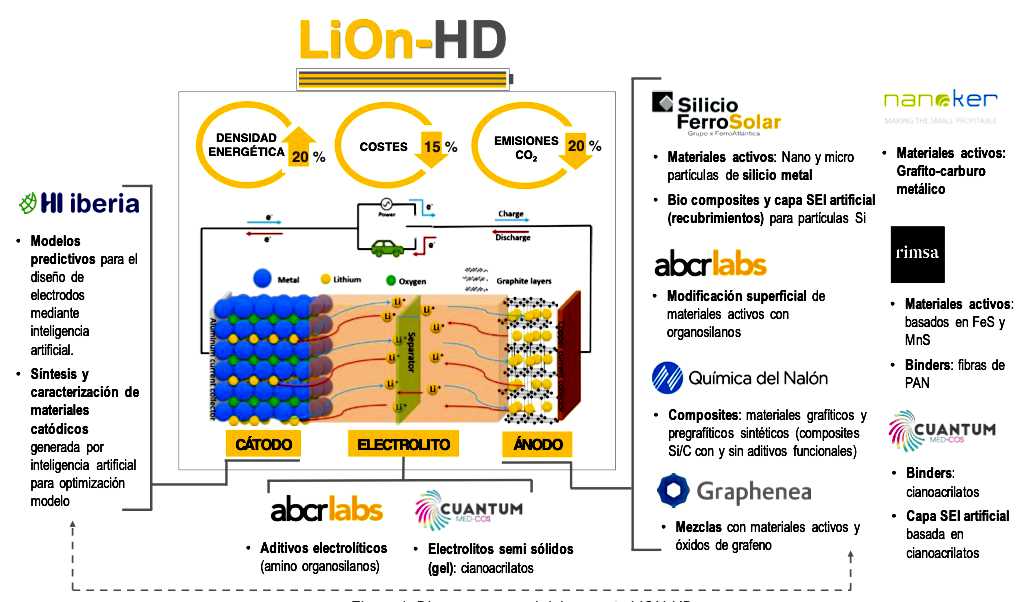LION-HD

PROJECT TITLE: Industrial research of strategic materials for high energy density and cost optimized lithium ion batteries in sustainable electromobility
PARTNERS
Unión sinérgica de un conjunto de 8 empresas del sector de materiales avanzados (Silicio Ferrosolar (SFS) (líder del proyecto) (GRAN EMPRESA); Química del Nalón (QN) (GRAN EMPRESA); NANOKER (PYME); RIMSA (PYME); ABCRLabs (GRAN EMPRESA); GRAPHENEA (PYME); CUANTUM Medical Cosmetics (CUANTUM) (PYME)) y softwares de simulación (Hi- IBERIA (PYME)) y la participación relevante de 9 organismos de investigación de alto prestigio nacional e internacional:CIDETEC; CETIM, CINN-CSIC, ICMAB-CSIC, ICMM-CSIC, UDC, USC, UAB, UA.
TOTAL FUNDING: 4.143.878,45 €
HI-IBERIA & ICMM FUNDING : 491.246,25 €
EXECUTIVE SUMMARY
The transition to a climate neutral Europe requires fundamental changes1. Batteries are a key enabling technology for this change, primarily in the electromobility sector. However, there are great technological challenges to meet current needs and achieve this transition. The need for batteries with higher energy yields, outstanding service life and reliability, increased safety and environmental sustainability, all with cost-effective large-scale production, is growing rapidly and at an ever-increasing rate. The European Commission launched the European Battery Alliance2 to address this industry challenge in a market expected to have an annual value of € 250 billion from 2025, where there is enormous space due to high demand. Europe seeks to be competitive in the global battery sector to drive electric mobility and energy storage forward, currently led by Japan, Korea and China (more than 90% of production).
Lithium-ion batteries have appeared with great prominence due to their potential to achieve high energy densities and long life times, compared to others such as nickel-cadmium or lead acid. The European road maps place this technology as the dominant one in the market in the present decade, forecasting a drastically growing future for the next ten years3. However, currently LIBs are not close to their limits. The main points of improvement are the autonomy of electric vehicles (it is still slightly less than half that of internal combustion cars) and battery charging times (they are too long in relation to the time to fill the gas tank or diesel).
Meeting these challenges requires disruptive ideas that enable the creation of sustainable batteries of the future. In particular, the energy efficiency, costs and CO2 emissions of a LIB depend mainly on the chemical nature of the materials that make up the cathode, anode and electrolyte of the cell. For this reason, in order to achieve substantial improvements in the field of sustainable and efficient electromobility, the study of advanced materials, a key enabling technology identified as a priority for EU industrial policy4, is of vital importance.
The main objective of the LION-HD project is to significantly improve the energy density, cost and sustainability of lithium-ion batteries through innovative research in advanced active and inactive materials and their synergistic combinations for the different components of the electrochemical cell ( anode, electrolyte and cathode), exceeding their current limits, thus facilitating the evolution and transformation of the transport sector towards sustainability, decarbonisation and drastic reduction of emissions.

